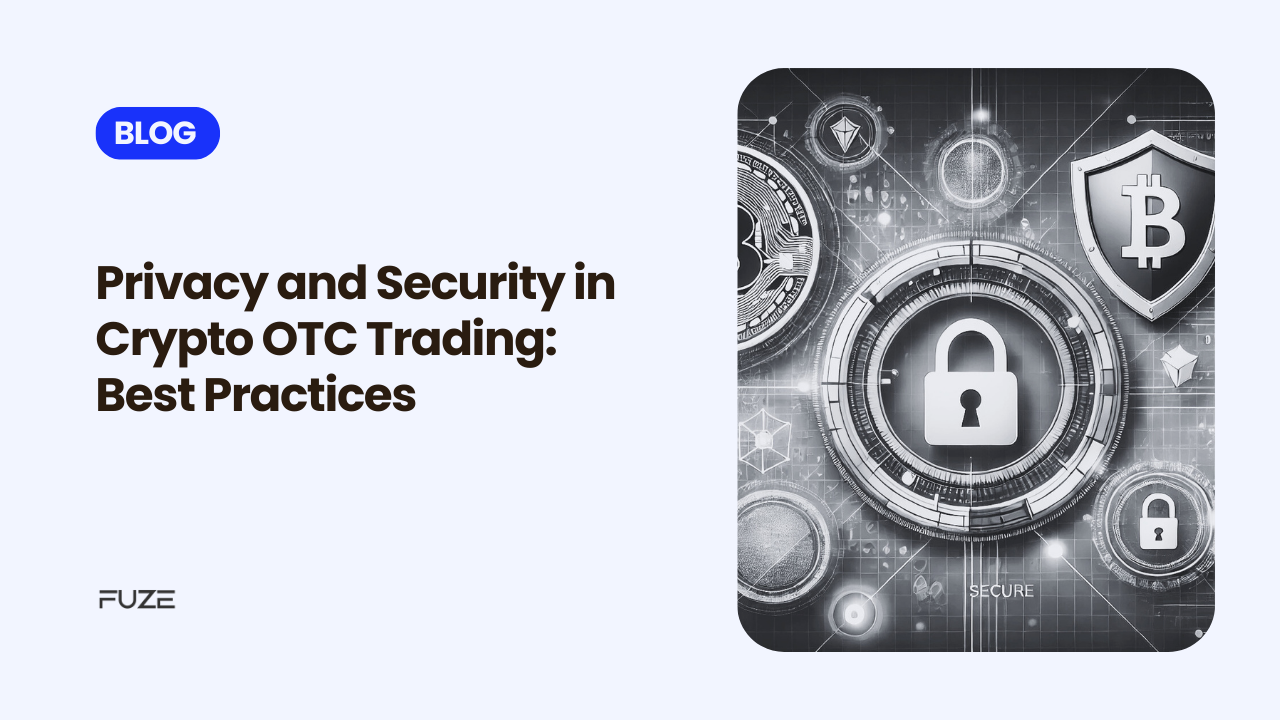OTC (over-the-counter) crypto trading has become a go-to option for investors and institutions looking to move large amounts of cryptocurrency efficiently and discreetly. Unlike public exchanges, OTC trading allows buyers and sellers to negotiate directly, which is great for avoiding market impact but comes with its own set of challenges.
Privacy and security are at the forefront of these challenges. For traders moving significant funds, the stakes are high. A breach of privacy or security can result in financial losses and reputational harm. This guide will explore the essential best practices to ensure safe and private OTC crypto trading.
Understanding the Importance of Privacy and Security in OTC Trading
1. Why Privacy Matters
In OTC trading, privacy goes beyond personal discretion—it is about protecting sensitive financial information and maintaining a competitive edge. Large transactions made public can signal market movements, leading to price volatility. This is especially relevant for institutional players and high-net-worth individuals whose trades can influence markets.
2. The Security Imperative
With increasing sophistication in cyberattacks and fraud schemes, security is a critical aspect of OTC trading. Mishandled transactions or breaches can result in significant financial losses, reputational damage, and even legal repercussions.
The decentralized nature of cryptocurrencies adds another layer of complexity. While blockchain technology provides inherent security through cryptographic protocols, its pseudonymous structure makes it a target for illicit activities if proper safeguards are not in place.
Key Privacy Tips for OTC Trading
1. Work with Reputable OTC Desks
Not all OTC providers are created equal. Choose ones with strong reputations for confidentiality. Established desks often use encryption, data protection protocols, and strict internal policies to keep your transactions private.
2. Minimize Shared Information
Only share what’s absolutely necessary for a transaction. Discussing your trading plans publicly or even within untrusted circles can expose you to risks. Confidentiality agreements with your OTC desk can provide added reassurance.
3. Use Encrypted Communication Tools
Always use secure channels when discussing trades. Messaging apps like Signal or encrypted email services ensure that no unauthorized party can intercept your discussions.
Security Practices Every Trader Should Follow
1. Conduct Due Diligence on OTC Providers
Don’t jump into a deal without vetting the desk. Reputable desks often have strong ties to liquidity providers and maintain high-security standards. Look for reviews, partnerships, and compliance with regulations.
2. Use Cold Wallets for Storage
Cold wallets are offline storage options that protect your crypto from online threats. Storing large amounts of cryptocurrency in these wallets ensures they’re safe from hacks.
3. Enable Multi-Signature Wallets
Multi-signature wallets require approval from multiple keys before transactions can go through. This minimizes the risk of funds being stolen if one key gets compromised.
4. Enable Two-Factor Authentication (2FA)
Always secure your accounts with 2FA. This extra layer ensures that even if someone gets your password, they can’t access your accounts without a secondary verification.
5. Verify Counterparties
Trading in OTC markets often involves direct dealings with another party. Ensuring your counterparty is legitimate reduces the risk of fraud. OTC desks that enforce KYC (Know Your Customer) and AML (Anti-Money Laundering) protocols add a layer of protection.
How Technology Helps Secure OTC Trades
Blockchain Monitoring Tools
Transaction monitoring tools can track unusual activities and prevent you from dealing with flagged addresses. While blockchain is transparent, these tools can help detect potential fraud.
Privacy-Oriented Cryptocurrencies
If privacy is a top priority, coins like Monero and Zcash are designed to hide transaction details. This adds an extra layer of confidentiality for sensitive trades.
Smart Contracts for Trustless Transactions
Smart contracts allow you to complete trades automatically once certain conditions are met. They eliminate the need to fully trust the other party, reducing risks in OTC deals.
Navigating Regulatory Compliance
While privacy is important, compliance with laws is non-negotiable. Reputable OTC desks follow strict KYC and AML guidelines to meet legal standards. These measures help traders avoid penalties and ensure their funds aren’t tied to illicit activities.
Common Security Threats in OTC Trading
Phishing Scams
Fraudsters may impersonate OTC providers or send fake emails to trick traders. Always double-check communication sources before clicking any links.
Man-in-the-Middle Attacks
If your communication channel is not encrypted, third parties can intercept and manipulate messages. Stick to secure messaging platforms to avoid this risk.
Insider Risks
Even a trusted OTC desk can be vulnerable to rogue employees. Choose providers with strict internal controls to minimize insider threats.
Malware and Ransomware
Store sensitive data like wallet keys offline. This protects against ransomware attacks that could encrypt or delete your files.
Conclusion
Crypto OTC trading opens doors to high-volume transactions and unmatched liquidity. But without strong privacy and security measures, these benefits come with risks. By following best practices—such as choosing reputable desks, using secure wallets, and enabling two-factor authentication—you can trade confidently.
At Fuze, we understand the critical importance of privacy and security in OTC crypto trading. Our platform combines state-of-the-art encryption, multi-signature wallets, and strict protocols to ensure every trade is secure. We work closely with clients to tailor solutions that meet their specific needs, providing a seamless experience for high-volume trades.
Disclaimer: Virtual assets carry significant risks, including high volatility and potential loss of your entire investment. They are not backed by governmental protections, and recourse may be limited in case of loss. Always assess your risk tolerance, fully understand the risks, and seek independent financial advice if needed before investing.
Frequently Asked Questions
1. What is OTC crypto trading?
Over-the-counter (OTC) crypto trading refers to the direct exchange of cryptocurrencies between buyers and sellers outside of traditional exchanges. It is often used for high-volume trades to avoid impacting market prices.
2. Why is privacy important in OTC crypto trading?
Privacy in OTC trading helps prevent competitors from gaining insights into trading strategies, avoids market manipulation, and safeguards sensitive financial information.
3. What are the biggest security risks in OTC crypto trading?
Common risks include phishing scams, man-in-the-middle attacks, insider fraud, malware, and trading with unverified counterparties.
4. How can I ensure my OTC transactions remain private?
Use reputable OTC desks, encrypted communication tools, and privacy-focused wallets. Avoid publicly discussing your trades and consider non-custodial solutions for added control.
5. What measures do reputable OTC desks take to ensure privacy and security?
Reputable OTC desks employ encryption protocols, secure storage options (e.g., cold wallets), multi-factor authentication, and confidentiality agreements. They also adhere to regulatory compliance standards like KYC/AML.







